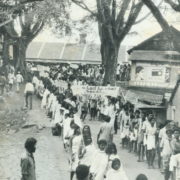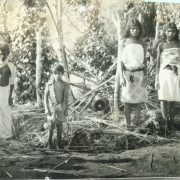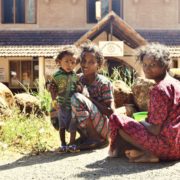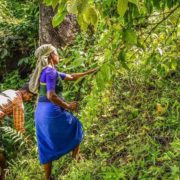A huge land grab is threatening India’s tribal people.
/0 Comments/in Uncategorized/by adminA huge land grab is threatening India’s tribal people. They need global help
Mari Marcel Thekaekara
About 8 million indigenous people in India are in danger of being evicted from forests that their ancestors have lived in for millennia. This grave injustice follows a shocking supreme court ruling that rides roughshod over the rights of India’s indigenous people, known as Adivasi, or tribals.
According to the 2011 census, these tribal people number 104 million – almost 9% of the country’s then 1.2 billion population. It is the largest indigenous population in any country in the world, occupying 22% of India’s geographical terrain.
A number of Indian wildlife and conservation organisations, including Wildlife First, the Wildlife Trust of India, and the Tiger Research and Conservation Trust have accused the tribal people of destroying the forests’ biodiversity and have petitioned the court to clear them from the land. Yet the 2006 Forest Rights Act gave Adivasi rights to live on and protect the land that they had been cultivating within forest boundaries.
The debate about wildlife versus forest dwellers is an old one. But most Indian NGOs understood years ago that the Adivasis were not the enemy, and they have been fighting on the same side. Having lived with my family in a forested area for three and a half decades, I know that the people live in harmony with nature and that evicting tribals will leave the forest unguarded and vulnerable – and make it a haven for poachers.
The Forest Rights Act undid historic injustices perpetrated on the communities of forest dwellers for centuries. It has empowered tribal councils to reject planning applications by mineral companies, such as UK-based Vedanta, to mine for bauxite in the Niyamgiri hills.
But under the act, tribal people had to file a claim with state governments to secure the title deeds to their lands – and thousands of claims by Adivasis have been rejected all over India. The country’s highest court has now decreed they are “encroachers” and should be evicted.
States have been told to begin evictions by July if tribes cannot produce documented evidence proving ownership. How can people who did not have paper, who did not know they had to have written entitlement to live on land their ancestors occupied, be expected to produce relevant title deeds?
There was no state lawyer defending the rights of the Adivasis in court against these conservation groups. It is shameful that a government whose duty it is to defend its poorest and most vulnerable citizens failed to supply a defence attorney against the petition. Why was this? Is the government complicit in this massive land theft? It would appear so.
Fertile food-producing lands have been forcibly taken from hapless farmers and gifted at throwaway prices to billionaire industrial groups. And this isn’t the first time villagers have been removed from land in the name of development.
A case in point is the infamous Narmada eviction. On 12 December 1979, in spite of widespread protests, the Indian government decided to raise the height of the Sardar Sarovar dam on the Narmada river – and to construct 30 major, 135 medium, and 3000 small dams. This, they announced, would provide water to about 40 million people, along with irrigation, and electricity to people in the region. To achieve this, 200,000 people were displaced, of whom a majority were Adivasis.
Now in a total travesty of justice, the original forest-dwelling communities, with the smallest ecological footprint, face being ousted from their homelands in the name of saving the environment.
The conservation groups opposing tribal rights are misguided. They say that granting forest rights to tribal people created fragmentation and a huge threat to biodiversity. In fact, tribal people protect many plant species such as roots and tubers as a food source.
Stephen Corry, director of Survival International, the global movement for tribal peoples, says: “This judgment is a death sentence for millions of tribal people in India, land theft on an epic scale, and a monumental injustice.” He adds: “Will the big conservation organisations like WWF and WCS condemn this ruling and pledge to fight it, or will they be complicit in the biggest mass eviction in the name of conservation, ever?”
A public campaign must be started to restore the rights of the tribes people. Human rights defenders in India are furiously fighting the order. So are international groups.
Time is of the essence.
Mari Marcel Thekaekara is a human rights activist and writer based in Gudalur, Tamil Nadu. In 1985 she co-founded Accord to work with Adivasi people
Article link : https://www.theguardian.com/commentisfree/2019/feb/25/land-grab-tribal-people-india-adivasi
let them have the right, the privilege and the power
/0 Comments/in Uncategorized/by admin….to plant a seed,for a tree, that will be nurtured,and will grow, whether fruits of tree will be enjoyed by all.. because it will be common property.. and not to make this private property, not make it proprietary, but to make it open source, make it common property and let the people who cannot use this,who do do not use this today, let them have the right, the privilege and the power to use this technology for their own good, for their own social change and give them the bargaining and negotiating power with the government…
Response to the negative impacts of globalization
/0 Comments/in Blog/by adminOur theoretical and conceptual framework grew out of our experience and practice. When India decided in 1991 to move down the path of globalisation, we realised that new economic structures were being created – ones over which we had little control. Decisions made in far away places could have huge negative impacts on the communities we were working with. In spite of decades of work to lift the adivasis of the Gudalur Valley out of poverty they could very easily and quickly slip back unless we found ways of dealing with the globalisation juggernaut.
Sadly by the end second half of the nineties, our worst fears became a reality as tea prices crashed and our community of adivasi tea farmers was plunged back into poverty.
Just Change was our response to these negative impacts of globalisation. We decided to develop new and alternative trade structures, ones that would link the local to the global. Structures and ways of working that were based and driven by human values and not blind profit. If we must have a global village, let it be one of our own making!
This was the thinking that led to us developing the theoretical framework of Just Change.
Coffee Procurement
/0 Comments/in News/by adminIn the last 2 months, 7.5 tones of Coffee has been procured from more than 100 Adivasi farmers .
Forest shade grown coffee
/0 Comments/in Blog/by adminForest trees are good, for the environment and for your coffee too, having more forest trees maintains tree diversity and also increases coffee production and quality.
India, the world’s sixth largest coffee-producer, grows ‘shade’ coffee, under the canopies of trees.
The coffee gatherer have unique Naturally grown coffee plants under the shades of native trees inside the Nilgiris region of western ghat.





